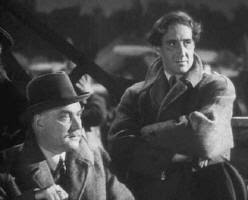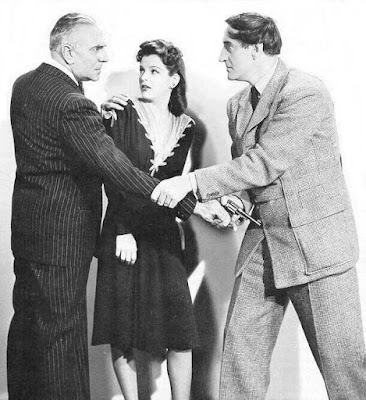In 1942, Universal Pictures retooled Sherlock Holmes. They opened their first movie featuring Arthur Conan Doyle's great detective with a title card that described the character as a timeless figure that works equally well in his "native world" of late 19th century London or the "modern day" of the 1940s. This film, and the sequels that followed--several of which saw Holmes cross wits with Nazis and their agents--show this to be true. (And the recent BBC series "Sherlock" reminded us of the fact, when Holmes and Watson were effectively transported to 21st century London with smart phones, and blogs, and everything.)
The initial Universal Holmes films pitted him against the great evil of the 1930s and 1940s, Nazi Germany and their sympathizers around the world. They are the sort of films I wish Hollywood would make today, instead of churning out crap that portrays those who fight and die for our freedoms--the American military and its allies--as the villains.
This article presents reviews of all the "Holmes vs. the Nazis" pictures in observance of the day Hitler killed himself and thus cemented his reputation as a pathetic little coward.
Sherlock Holmes and the Voice of Terror (1942)
Starring: Basil Rathbone, Nigel Bruce, Henry Daniell, Thomas Gomez, and Reginald Denny
Director: John Rawlins
Rating: Six of Ten Stars
As Hitler's armies devour mainland Europe, Sherlock Holmes and Dr. Watson (Rathbone and Bruce) are retained by British Intelligence to stop the activities of Nazi saboteurs being coordinated by the mysterious Voice of Terror in radio broadcasts that hijack the British airwaves once a week. Holmes soon comes to suspect that the broadcasts portent something far more sinister and dangerous than the horrific acts of terrorist... and that the enemy within England itself is more powerful than dreamed of in the worst nightmares.

Loosely based on Conan Doyle's "His Final Bow" (where Holmes came out of retirement to catch a German spy at the beginning of WW1) and the real-life Nazi propaganda broadcasts that overrode BBC signals during the early 1940s, "Sherlock Holmes and the Voice of Terror" is the first of a dozen Holmes movies starring Basil Rathbone and Nigel Bruce that transports the Great Detective and his loyal sidekick to modern day England. (Modern-day being the 1940s.)
Holmes' methods receive a slight upgrade--the key to unlocking the mystery behind how the Voice of Terror is able to coordinate the broadcasts and the sabotage involves analyzing different types of broadcast with cutting edge audio equipment--he trades in his deerstalking cap and tweed cape for an fedora and overcoat, and the speed of modern travel and communication also impacts the story, but overall the character of Holmes is as it's found in the pages of Doyle.
Although partly a war-time propaganda movie--the kind that I've lamented aren't made anymore, what with American filmmakers preferring to glorify those who would take away their freedom rather than those who defend it--with the patriotic speeches and dastardly Nazi villains that encompasses, the film sets the tone for most of the Universal efforts that will follow. Holmes is a renegade genius, Watson is a doddering moron that seems like he is going senile (even if he isn't quite as dimwitted here as he seems in later pictures), and the villains are of a stripe that would make even the worst of the worst that inhabited the pages of pulp fiction magazines in the 1930s give them a wide berth. But the stories are exciting and fun, so the bad treatment of Watson can be overlooked... as well as the absolutely rediculous hair style that Holmes sports in these early Universal films. (Transporting Holmes to modern-day was the idea of Basil Rathbone who felt the Victorian era was too old fashioned, so I wonder if he was also the genius behind that awful hair.)
While Watson as a ninny didn't originate with the Rathbone/Bruce pictures--there were hints of it as far back as the Arthur Wontner pictures--but it was these pictures that solidified the approach as "standard." The same is true of Holmes as nearly 100% hands-off as far as physical altercations go; when a brawl breaks out between Nazi agents and Limehouse ruffians hired by Holmes as muscle, you almost get the sense that Holmes is afraid to get in the middle of the fight. The Rathbone Holmes seems like he would never throw a punch but would instead leave it to others even in the most dire of situations, so it is with these films that the idea that a "action-oriented" Holmes isn't truthful to Doyle began.
The strong presence of these somewhat legacies aside in this film doesn't really harm the entertainment value, however. The story is too fast paced for anything but Holmes bad hair to distract from the fun, and excellent performances by the stars and supporting cast only made it that much better.

Basil Rathbone is excellent as always as Sherlock Holmes (even if I will always prefer Peter Cushing's portrayal) and Nigel Bruce is solid as the comic relief, perhaps even moreso than in future sequels as less of the humor is at the expense of his character than will become the norm. Other standout performances are delivered by Henry Daniell (who will return to the series again and again, as a different villainous character almost every time) and Reginald Denny as power-brokers in British Intelligence, either of which could be a double-agent and the Voice of Terror himself. Finally, Evelyn Ankers has a small but important part as a Limehouse bar girl who helps Holmes track the Voice of Terror's main operative for deeply personal reasons.
Sherlock Holmes and the Secret Weapon (1943)
Starring: Basil Rathbone, Nigel Bruce, Lionel Atwill, William Post Jr, Kaaren Verne and Dennis Hoey
Director: Roy William Neill
Rating: Seven of Ten Stars
Sherlock Holmes (Rathbone) is charged with rescuing a Swiss scientist (Post) and his revolutionary new bomb-sighting system from the Nazis and bringing him safely to England. However, when the scientist turns out to have too high an opinion of himself and his intelligence, and he falls into the hands of British Nazi agents, Holmes finds himself in race against his old nemesis Professor Moriarty (Atwill) to unlock a coded message that reveals where the prototype of the bomb-sight is hidden.

"Sherlock Holmes and the Secret Weapon" is the second of Universal's "Holmes vs. the Nazis" flick, and it is not only a fun Holmes adventure but a passable espionage thriller. The opening sequence where Holmes outsmarts the Gestapo agents who have crossed into Switzerland to kidnap genius inventor Franz Tobel is a great bit of filmmaker--and the only part of the film that stuck with me from the first time I saw this film at some point in the distant past. (I have no memory of watching this film before, but that opening bit, the revelation of Holmes, and the get-away was all very familiar to me.)
Like many movies of this type, the villains initially benefit from the fact that Holmes' charge may be a genius when it comes to inventing military hardware, but he's otherwise an idiot who ends up in Professor Moriarty's clutches because he had sneak out for a clandestine booty call and because of irrational demands placed on the British security forces regarding the production of his bomb sights. This is what leads to the race to decrypt the code. Apparently, Dr. Tobel is SUCH a genius that he knew the clandestine booty call was a bad idea, so he wrote a code he thought only Holmes would be able to help build his bomb sight should he come to a bad end. Too bad for Tobel that a man almost as part as Holmes is the one who grabbed him.

Speaking of Moriarity, Lionel Atwill gives an excellent performance as Holmes' evil opposite. The script writers also do a nice job of demonstrating his sinister genius by having him and Holmes discover the key to unlocking a particular complicated part of the code only by accident. (I suppose this means that neither are as smart as Tobel gave them credit for... but at least neither Holmes nor Moriarty would sneak out for booty calls while Nazi agents are prowling the streets looking for them.)
In some ways, actually, the film makes Moriarty out to be a bit smarter than Holmes in some ways, but ultimately too crazy to be as effective an evil genius as he might be. Twice during this picture, Holmes places himself completely at Moriarty's mercy, presumably assuming that the evil professor won't just kill him. A pretty stupid thing to do, and one that almost backfires at one point and leads to a more chilling portrayal of Moriarity than I've ever seen. Still, if he had just killed Holmes instead of being duped into killing him slowly (by Holmes playing off Moriarty's ego and sadism), he would have won the day AND the war for his Nazi paymasters.
Then again, if Moriarty had been as smart as Holmes, he wouldn't have teamed up with Nazi losers to begin with... and there wouldn't have been a movie.
"Sherlock Holmes and the Secret Weapon" is a film that you'll enjoy if you get a kick out of old-time thrillers and pulp-fiction style detective tales. Hardcore Holmes fans will probably mostly enjoy the film for it being a sequel of sorts to Doyle's "The Dancing Men" short story, but only if they aren't too annoyed by Holmes and Watson being transplanted to 1940s London instead of 1880s London. (And all of us will have to ignore the goofy looking hair-do on Holmes. I will have to get around to researching that. It is so stupid looking there HAS to be story behind it.)
Sherlock Holmes in Washington (1943)
Starring: Basil Rathbone, Nigel Bruce, Marjorie Lord, Henry Daniell and George Zucco
Director: Roy William Neill
Rating: Eight of Ten Stars
When a British secret agent vanishes while on a mission to Washington, D.C., the British government sends Sherlock Holmes and Dr. Watson (Rathbone and Bruce) to the United States to uncover what happened to him and to learn if valuable secrets have fallen into the hands of the Nazis.

"Sherlock Holmes in Washington" is the final and best of the Universal "Holmes vs. the Nazis" trilogy of films. It features a well-crafted and suspenseful plot that takes full advantage both of Holmes' legendary deductive powers as well as the modern (early 1940s) setting, with the mystery revolving around missing documents that unbeknownst to heroes and villains alike have been duplicated on microfilm and hidden inside a matchbook that is then passed from character to character and almost lost for good on more than one occassion. The fact that the audience knows exactly where the documents everyone is looking for adds greatly to the suspense (and fun) of the film as it unfolds.
In addition to its expertly constructed plot, the film also features well-written dialogue that is delivered by a cast that are all at the top of their game. Rathbone's Holmes is the best I've ever seen itm Bruce's Watson is comedic but not annoyingly dimwitted, and Daniell and Zucco are excellent as the Nazi secret agents. From the film's opening scenes to the closing anti-fascism remarks from Holmes, this is a film that provides top-notch and classy entertainment. It's a move that fans of Sherlock Holmes and classic crime dramas will enjoy equally. (Heck, even if you're some sort of misguided moron who admires Nazis, you'll enjoy this flick. The ones in this story are smarter than the average bunch, be they fictional or real.)



















